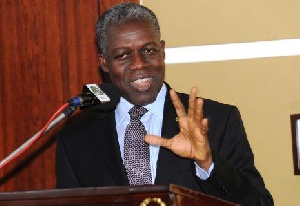Vice President Kwesi Amissah-Arthur has pledged government’s support for the next phase of the National HIV Response programme.
He also called on the Ghana AIDS Commission (GAC) to continue with its high level advocacy and ensure that it includes the political leadership.
Vice President Amissah-Arthur said this at the opening of the 11th Annual Partnership Forum of the Ghana AIDS Commission in Accra.
The two-day conference, which is on the theme: “Fast-tracking the National Response towards 90-90-90”, is to afford partners and stakeholders the opportunity to take stock of the progress made in the National HIV Response and the capacity to achieve the three 90s by 2020.
Besides, the GAC has come to the end of implementing the National HIV and AIDS Strategic plan 2011-2015, and it is expected that findings and evaluations of the previous plan would help guide the development and operationalisation of a new HIV and AIDS Strategic plan 2016-2020.
Vice President Amissah-Arthur also assured the partner institutions like UN AIDS and other stakeholders of government’s commitment to the National HIV Response.
He urged the country’s development partners and stakeholders at the forum to make the needed commitments to help bridge the funding gap in the prevention, treatment, care and support for HIV/AIDS.
He called for the fast-tracking of the National HIV Response to the 90-90-90 target.
Dr Angela El-Adas, Director-General of the Ghana AIDS Commission, said over the years Ghana has made significant progress in implementing the current National Strategic Plan for HIV and AIDS.
She said following the consistent declining trends in adult prevalence of HIV over a 10 year period, the country is beginning to observe some stabilization of Ghana’s epidemic.
She said the relatively low prevalence of 1.4 percent in 2014, which translates into 250,232 Persons Living with HIV and AIDS (PLHIV) in Ghana, including some 21,223 children who form eight percent of the total population of Persons Living with AIDS.
Dr El-Adas said the coverage of PLHIV on anti-retroviral treatment continues to increase steadily but slowly.
She said by the end of 2014, it was estimated that 34 percent of all PLHIV had been initiated on treatment. However, the fact remains that unlike adults who enjoy a more robust treatment programme, less than 25 percent of the children currently have access to effective life-saving treatment.
Dr El-Adas said the country has also seen a 43 percent reduction in annual AIDS deaths from 16,016 in 2009 to 9,248 in 2014.
“We can get to zero, when we learn to respect, love and accept each other and begin to provide quality HIV service in an environment free of stigma and discrimination” she added.
Dr Haile Mariam, UN AIDS Country Director, said Ghana was on course to reduce HIV/AIDS prevalence to the barest minimum in the next five years.
He said mother to child transmission currently stands at five infections a day, which he said was very small, adding that with determination, that could be eliminated in a few months.
He said even though Ghana could be declared AIDS free, second after Cuba, there still remained some challenges which need to be tackled.
Health News of Wednesday, 18 November 2015
Source: GNA

















